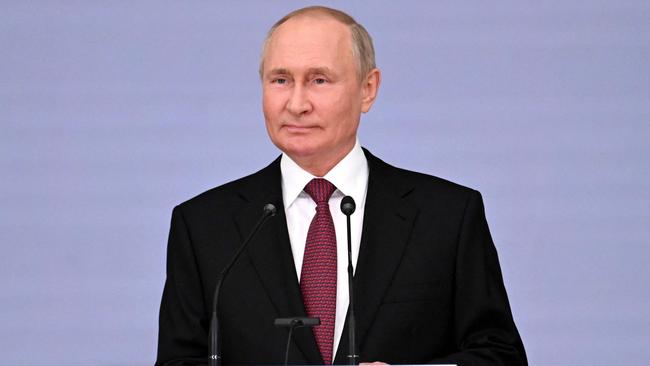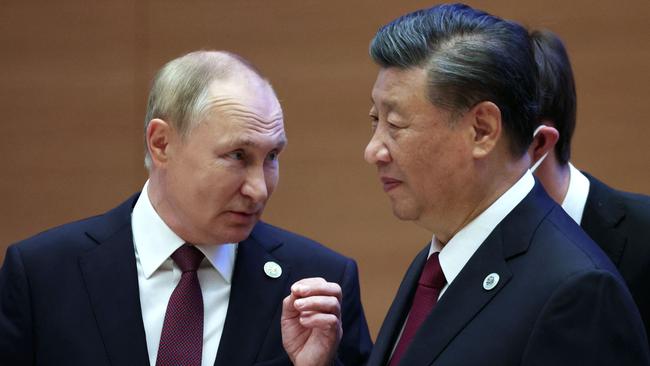Vladimir Putin to address nation Russia moves to annex occupied lands
Integration of occupied regions into Russia would represent a major escalation as Moscow could say it’s defending its territory from Ukrainian forces.

Vladimir Putin is expected to address the nation today (AEST) for the first time since the start of the Ukraine war, as officials say Moscow-held regions of Ukraine will urgently vote on annexation by Russia this week.
As Kyiv’s troops wrest back territory captured by the Kremlin’s forces, pro-Russia authorities in the eastern Donetsk and Lugansk regions, as well as in the southern Kherson and Zaporizhzhia regions, said they would hold the vote over five days beginning Friday this week.
The regions are on the frontlines of a sweeping Ukrainian counter-offensive that has seen Kyiv’s forces retake hundreds of towns and villages that had been controlled by Russia for months.
Their integration into Russia would represent a major escalation of the conflict as Moscow could try to say it was defending its own territory from Ukrainian forces.
The Russian President had been expected to make a televised address on Tuesday evening local time, but local media now say he will speak between 8am - 10am local time (3pm - 5pm AEST).
Washington, Berlin and Paris denounced the ballots and said the international community would never recognise the results while NATO said the votes marked a “further escalation” of the war.
Kyiv said the “sham” referendums were meaningless and vowed to “eliminate” threats posed by Russia, saying its forces would keep retaking territory regardless of what Moscow or its proxies announced.
Denis Miroshnichenko, a separatist leader in the Lugansk region, said pro-Moscow lawmakers had voted to hold the vote from September 23 to 27.
Shortly afterwards, a news portal associated with separatist authorities in Donetsk said the region would hold a ballot over the same dates.
Large parts of the industrial Donbas area -- made up of Donetsk and Lugansk -- have been controlled by Moscow-backed separatists since 2014, after nationwide demonstrations ousted a Kremlin-friendly Ukrainian president.
Russia at the time annexed the Crimean peninsula on the Black Sea from Ukraine with a vote that was criticised by Kyiv and the West, which imposed sanctions in response.
Authorities in the southern Kherson region of Ukraine also announced on Tuesday they would hold a vote over the same dates.
“The incorporation of the Kherson region into the Russian Federation will secure our territory and restore historical justice,” said the Moscow-installed head of that region, Vladimir Saldo.
He echoed a phrase used earlier in the day by Russia’s former president and prime minister Dmitry Medvedev, who invoked correcting historical wrongs but also said the votes would bolster Russian forces.
“Encroachment into Russian territory is a crime and if it is committed, that allows you to use all possible force in self-defence,” Mr Medvedev, now the deputy chairman of Russia’s security council, said on social media.

Pro-Moscow authorities in Ukraine’s Zaporizhzhia region -- home to Europe’s largest nuclear power plant -- also announced they would hold a vote on the region’s “territorial allegiance”.
Ukrainian President Volodymyr Zelensky’s chief of staff, Andriy Yermak, vowed a decisive response from Kyiv.
“Ukraine will solve the Russian issue. The threat can be eliminated only by force,” Yermak said.
German Chancellor Olaf Scholz denounced the “sham” votes and said they must be rejected by the international community.
French President Emmanuel Macron called them a “travesty”, saying Russia’s invasion harked back “to the age of imperialism and colonies”.
White House National Security Advisor Jake Sullivan said the referendums were “an affront to the principles of sovereignty and territorial integrity”.
“The United States will never recognize Russia’s claims to any purportedly annexed parts of Ukraine,” he said.
Ukrainian Foreign Minister Dmytro Kuleba said the referendums would change nothing.
“Ukraine has every right to liberate its territories and will keep liberating them whatever Russia has to say,” he said in a statement online.
The votes come at a decisive moment.
Ukraine’s forces in the east are now pushing towards the village of Bilogorivka whose capture by Russia in May decimated Moscow’s forces as they crossed the Siverskyi Donets river nearby.
Political analyst Tatiana Stanovaya said the vote announcements were a direct result of the success of Ukraine’s eastern counter-offensive.
Mr Putin, she said, wants to threaten the full use of Russia’s military, including nuclear weapons, in defending Russian territory, including newly annexed regions.
“Putin does not want to win this war on the battlefield. Putin wants to force Kyiv to surrender without a fight,” she said.
The head of Russian state-media group, RT, Margarita Simonyan said the announcements marked either “the eve of our imminent victory or the eve of nuclear war”.
Speaking with newly appointed foreign ambassadors in Moscow on Tuesday ahead of the opening of the UN General Assembly, Mr Putin said Russia would pursue its “sovereign course.”
The initiative has received support from hawkish members of Russia’s political establishment, who argue that making occupied parts of Ukraine into parts of Russia proper would embolden Russia and give legitimacy to what it could portray as retaliatory strikes against its territory by North Atlantic Treaty Organization-backed forces.
The calls are being amplified by Russian officials who are angry over Russia’s humiliation and endorsing moves that might escalate the conflict. Mr Medvedev, deputy chairman of the Russian Security Council, wrote on Telegram Tuesday that the incorporation of new territories into Russia would become irreversible even under future presidents by amending the constitution.
In a move that appeared to ease the legal path to mobilisation in Russia, the country’s parliament on Tuesday advanced legislation that tightens penalties for evading mobilisation, desertion, surrender and looting during wartime. The lower house, the State Duma, approved amendments to bring in the concepts of mobilisation and martial law to the criminal code. However, the proposed legislation still needs to go through the Federation Council, the upper house of parliament, and receive Mr. Putin’s signature.
Under the proposed law, failure to show up for military service or desertion will be punished by up to 10 years in prison. Looting will be punishable by up to 15 years in jail.
Even if Moscow proceeds with mobilisation, it’s unlikely to produce effective results on the battlefield, said Dara Massicot, a senior policy researcher at the Rand Corporation who studies Russia’s military.
“If you called people up right now and trained them for months, then you could do something with them next spring and summer,” Ms. Massicot said. “But you still have the problems with who would train and lead them, and the equipment is in terrible shape.” The alternative would be partial mobilisation — calling up people out of the reserve in small numbers and giving them simple tasks like holding positions, she said. That would be more like the ad hoc mobilisation already under way.
“But you cannot grow highly trained personnel overnight, which is what they need,” she said.
The debate over whether to annex parts of Ukraine comes as Kyiv’s advance slows but continues to push Russia out of strategic areas such as a swath of land east of the Oskil River in the Kharkiv region, and as Russia scrambles to find the additional manpower to continue its war.
The proxy states that Russia recognised as independent in February don’t entirely control the areas of Ukraine that they claim as their sovereign territory. While their recognition could bolster the Kremlin’s false narrative about liberating rightfully Russian territories that it could claim are occupied by Ukraine, it could also highlight the fact that it is unable to take over territory it claims as its own.
Annexation could make it easier for Russia to conduct a mobilisation on occupied Ukrainian territory before taking the politically dangerous move of announcing a mobilisation at home. Vladimir Saldo, the Russian-installed head in Kherson, said Tuesday that “it is necessary to create volunteer battalions” to shore up defences against Ukraine.
Mr. Putin on Tuesday called on the defence industry to boost the production of Russian weapons, according to a statement from the Kremlin. Ukraine’s SBU intelligence service recently said Russian forces under pressure from Ukrainian troops were leaving whole ammunition arsenals behind as they retreated.
AFP, Dow Jones



To join the conversation, please log in. Don't have an account? Register
Join the conversation, you are commenting as Logout